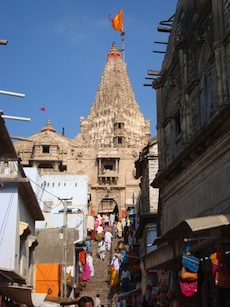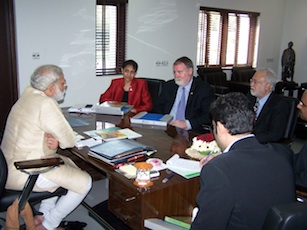PRESS RELEASE: Three Gujarat Holy Cities nominated to Green Pilgrim Cities network
March 3, 2011:
 |
 |
 |
Dwarka, Krishna Temple, Gujarat. CREDIT: Emmanuel Dyan
|
Dwarka, Somnath and Ambaji in Gujarat have been nominated to a new global network of Green Pilgrim Cities. The three cities are sacred for Hindus.
The announcement was made at CM House, Gandhinagar on Friday, February 25 during a meeting between Gujarat Chief Minister Mr. Narendra Modi and representatives from the Green Pilgrim Cities Network. The team included Kusum Vyas, for the Alliance of Religions and Conservation (ARC), David Cadman President of International Council for Local Environmental Initiatives (ICLEI), Emani Kumar, Executive Director of ICLEI’s South Asia Secretariat and Yogesh Vyas and Aditya Nawab of Living Planet Foundation.
During the meeting Mr Modi highlighted some of the green projects already initiated in Gujarat, where work is led by the Yatra Dham Vikas Board (Pilgrim Places Development Board). The Board ensures that environmental issues are addressed at every level of policy, especially in the context of local faith and traditional culture.
Innovative concepts such as solar parks and tree planting are being implemented in each of these three cities and could be models for other cities in India and elsewhere.
“Our pilgrim cities will be models of care and respect for the environment that will showcase environmentally sound technologies and practices and in doing so pilgrims, local officials, faith leaders and millions of faithful around the world will be inspired to be part of an unprecedented collaboration to combat climate change and loss of biodiversity,” Mr Modi said, adding that he wanted to make gardens in each city.
“Gujarat is uniquely positioned to implement green initiatives. ARC is delighted that these three important Hindu cities are joining this pilgrim cities initiative,” Ms Vyas said.
The next steps include a possible conference in Gujarat to highlight the Green Pilgrimage Network initiative and for extensive meetings to be held with the Yatra Dham Vikas Board, which has shown interest in the proposal.
 |
 |
 |
Meeting with Mr. Modi
Mr. Modi speaking. And (L-R): Kusum Vyas, David Cadman, Yogesh Vyas, Emani Kumar & Aditya Nawab
|
Action plans for each city will be unveiled at the Sacred Land summit in November 2011 at which the Green Pilgrim Cities initiative will be launched. This unprecedented event will be hosted by ARC in Xi’an, the traditional gateway for Daoist pilgrimages to sacred mountains in Central China and for Buddhist pilgrims travelling to India. It will be supported by the Chinese State Administration for Religious Affairs and supported by a number of key bodies including the Norwegian Government
About the Green Pilgrim Cities Network
In 2001, more than 60 million Hindu pilgrims attended the Maha Kumbh Mela, a festival held every 144 years in Prayag, Allahabad. This was the largest human gathering in recorded history. Even on any ordinary day of the year, hundreds of thousands of people around the world are on pilgrimage. Every year at least 100 million people become pilgrims, whether for a few hours, days, weeks or even months. Each is undergoing this journey to experience something sacred. It is as if whole cities are on the move, waiting to be transformed.
Imagine what could be achieved if pilgrims and pilgrim cities were to become models of care and respect for the environment, reflecting the deep values of the world’s faith traditions.
Imagine the good that could be done for the people and places on pilgrimage routes, and in the cities and sacred places at the end of the journeys.
Imagine a network of Green Pilgrim Cities, inspiring environmental care all along the great pilgrimage routes, and encouraging all pilgrims to leave a ‘positive footprint’ on their journeys and in their destinations.
The Green Pilgrim Cities Network Initiative is facilitated by the Alliance of Religions and Conservation (ARC), in partnership with Local Governments for Sustainability (ICLEI).
ARC has worked with the environmental side of sacred sites and pilgrimage routes for more than 20 years. In November 2009, in cooperation with the UNDP, ARC held a major event at Windsor Castle, England. Nine major world religions launched long term commitments to environmental action in what the UN described as “potentially the world’s largest civil society movement on climate change”.
At Windsor, several faith leaders responded enthusiastically to the idea of setting up a global network of green pilgrimage cities of all faiths. Every year at least 100 million people become pilgrims. Now the aim is to help faiths green their holy cities according to their own theology and understanding and for pilgrims and pilgrim cities to leave a positive footprint on the Earth.
Most faiths have now identified their pilot pilgrim cities. Plans to green these cities will be drawn up by each local faith community, in co-operation with the local authority, mayor or city council; several of these commitments include greening pilgrimage cities and routes.
Several cities have come forward as pilot Green Pilgrim Cities. Plans to green these cities will be drawn up by each local faith community, in cooperation with the local authority, mayor or city council, starting with the question: “What would your city be like if it were a sustainable green city?”
Faith leaders will commit to work with their own cities and will join a network to share information, support and technical knowledge. The network will engage secular as well as faith partnerships – academic institutions, NGOs, entrepreneurs, local authorities and others. It is particularly important for the Mayor and City Council to commit to the goals of the network.
The Green Pilgrim Cities Network Initiative is facilitated by the Alliance of Religions and Conservation (ARC), in partnership with Local Governments for Sustainability (ICLEI).
DETAILS ABOUT THE SECULAR PARTNERS
ICLEI: Founded in 1990, ICLEI provides technical consulting, training, and information services to build capacity, share knowledge, and support local government in the implementation of sustainable development of locally designed initiatives can provide an effective and cost-efficient way to achieve local, national, and global sustainability objectives.www.iclei.org/
Living Planet Foundation, USA, is leading the effort to form a partnership with a working team in Gujarat and help develop an interim plan leading to the design and implementation of the Green Pilgrim Cities Network initiative in Ambaji, Dwarka and Somnath.
www.livingplanetfoundation.org
The Alliance of Religions and Conservation (ARC) is an international secular organization founded in 1995 to work with the world’s major religions to help them develop environmental programmes based on their own core teachings, beliefs and practices. It also helps secular environment organizations work with the faiths to protect the natural world. www.arcworld.org
Link to projects2932.html?projectID=521 to read details of this programme and download a leaflet
|

